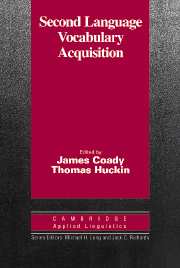Book contents
- Frontmatter
- Contents
- List of contributors
- Series editors' preface
- Acknowledgments
- I SETTING THE STAGE
- II CASE STUDIES
- III EMPIRICAL RESEARCH
- IV PEDAGOGY
- Chapter 10 Mnemonic methods in foreign language vocabulary learning: Theoretical considerations and pedagogical implications
- Chapter 11 L2 vocabulary acquisition through extensive reading
- Chapter 12 Teaching vocabulary
- Chapter 13 Pedagogical implications of the lexical approach
- V SUMMING UP
- Author index
- Subject index
Chapter 11 - L2 vocabulary acquisition through extensive reading
Published online by Cambridge University Press: 05 October 2012
- Frontmatter
- Contents
- List of contributors
- Series editors' preface
- Acknowledgments
- I SETTING THE STAGE
- II CASE STUDIES
- III EMPIRICAL RESEARCH
- IV PEDAGOGY
- Chapter 10 Mnemonic methods in foreign language vocabulary learning: Theoretical considerations and pedagogical implications
- Chapter 11 L2 vocabulary acquisition through extensive reading
- Chapter 12 Teaching vocabulary
- Chapter 13 Pedagogical implications of the lexical approach
- V SUMMING UP
- Author index
- Subject index
Summary
L1 vocabulary acquisition
The incidental vocabulary learning hypothesis (Nagy 8t Herman, 1985) is based on research into how children learn vocabulary in their native language. It proposes that the vast majority of vocabulary words are learned gradually through repeated exposures in various discourse contexts. Proponents of this view claim that learners typically need about ten to twelve exposures to a word over time in order to learn it well. They observe that native speakers can learn as many as fifteen words per day from the ages two to seven and therefore conclude that direct instruction of vocabulary cannot possibly account for the vast growth of students' knowledge of vocabulary. Consequently, Nagy and Herman (1987) argue that teachers should promote extensive reading because it can lead to greater vocabulary growth than any program of explicit instruction alone ever could.
L2 vocabulary acquisition
Following this same logic, it is argued that L2 learners who achieve advanced reading proficiency in a language will acquire most of their vocabulary knowledge through extensive reading rather than from instruction. For example, Krashen (1989), a leading proponent of extensive reading, argues that language learners acquire vocabulary and spelling most efficiently by receiving comprehensible input while reading. He claims that this results from the Input Hypothesis, i.e., successful language learning results from comprehensible input as the essential external ingredient coupled with a powerful internal language acquisition device. Krashen originally postulated the Input Hypothesis for oral language acquisition and in a recent study of oral vocabulary acquisition Ellis (1994) argues that it is “not comprehensible input but comprehended input that is important” (p. 481).
- Type
- Chapter
- Information
- Second Language Vocabulary AcquisitionA Rationale for Pedagogy, pp. 225 - 237Publisher: Cambridge University PressPrint publication year: 1996
- 13
- Cited by

